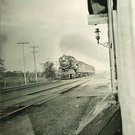The future begs for humble rationality
To the Editor:
I drive to Altamont three mornings a week to care for grandkids. The drive is a gift in every season but especially at this time of year. This escarpment-hugging village is abloom with such variety and profusion of flowers and trees that there is a celebratory sense to each arrival.
“Huzzah” I want to shout in harmony with its colonial-era settlers: As garden after garden catches my eye I find myself quoting the poet: “Oh world, I fear you are too beautiful this year!”
Of course, life affirmation comes to one as a long, cool drink in the desert in the face of the conflict-ridden, unstable, painfully problematic geopolitical climate of this historical moment.
Among the many challenging issues that have been plaguing me of late, rising up from the “news” alerts on my phone, the “yahoo” headlines on my search engine, the news crawl across my screen is that of Korea. I think my unease rises from the fact that I had realized recently that I was bereft of the historical knowledge needed to contextualize or understand the nature of our relationship to this nation that suddenly seemed to loom even larger in terms of “axis of evil” preoccupation and “fire and fury” doomsday threat.
So I began to do the rudimentary reading needed to have some sense of how we got to this moment. I still don’t pretend to know the nuanced details of how the Korean War started. These I have come to understand are always more complex than the history book skinny or the partisan interpretation.
I have learned, however, enough to be overwhelmed with the extent of the human suffering engendered on the people of that peninsula from 1950 to 1953. An estimated two-and-a-half million civilians were killed or wounded, as much as 15 percent of the civilian population in the North alone.
In the North, every city, every hamlet was laid waste, firebombed, napalmed — a “fire and fury” that ended only when United States military officials determined that “there was not a single building over one story left in the country.” Even the battle-tried General Douglas MacArthur was reputed to have said, after surveying the ravaged north, that it “made him vomit and his blood curdle.”
This understanding certainly provides context for the bizarre evolution of this self-isolating, paranoid, violence-embedded state and its need to develop and cling to its own weapons of mass destruction as a (dead-ended as it is) hedge against annihilation redux. This understanding also begs that a deep historical understanding devoid of platitude and self- serving militaristic rhetoric must be brought to the table.
To further provide context for my understanding of what’s at stake in the current go-round of our disjointed pas de deux with Kim Jong-un, I have been reading Daniel Ellsberg’s recent book “Doomsday: Confessions of a Nuclear War Planner,” as well a series of essays, edited by Helen Caldicott: “Sleepwalking to Armageddon.”
Both make clear how tentative our hold is on preventing a nuclear war; how as we talk about modernization of these instruments of horror with such cold calculation and pride, we move the hands of the doomsday clock precipitously forward; how dangerous a leadership that would ask: “Why can’t we use ’em ?”; how fragile and vulnerable our place upon this planet; how intense, imperative, fiercely urgent the need to learn to speak peace, seek peace, act rationally, find mutual paths not of assured destruction but of mutual planetary sustainable coexistence.
This needs to be the framework of our negotiations, in this relationship, in all our international relationships. As simplistic as this may sound, the future begs for humble rationality, a spirit of human community and thus determined and true diplomacy. If only we can find ways as citizens to fruitfully clamor and insist on this.
I can't help but think that before the bombs fell in Hiroshima and Nagasaki — in all places scorched and burned by other eras’ barrages of “fire and fury”; before the little villages and hamlets of North Korea were laid waste by pitiless, endless bombing, beautiful gardens greeted the morning and grandmothers hurried to sing praise to the day and to embrace their darlings.
If only we as a nation could come to disavow the sense that we are exempt from the forces of history. One can only hope that we have sufficient time, eschewing bombast and exceptionalism, to find the will and the way so that our gardens will continue to bloom.
That will truly be a “Huzza” moment.
Maureen Aumand
Colonie
